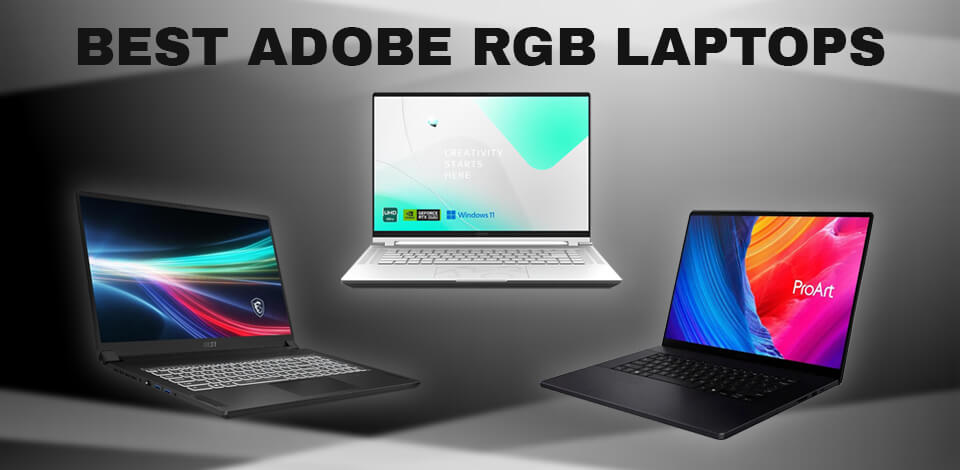
Working as a product and jewelry retoucher at FixThePhoto, I know that it’s essential to use the best Adobe RGB laptop to match shades with high accuracy. Such models allow me to reproduce realistic tones of gold rings and gemstones to make my projects look professional.
I had been using the Dell Inspiron 15 7000 for a while. While it has decent specs, I had a lot of issues because of its sRGB-only display and inaccurate color calibration. Even if something looked amazing on my screen, the colors might look bleaker on client laptops or in printed catalogs.
When I voiced my frustration when talking to my colleagues, they advised me to find a laptop with full Adobe RGB coverage. What makes it different from sRGB displays is that they cover a complete color gamut. It becomes especially noticeable when you work with green and cyan shades. As I often need to edit such photos, I realized that it was time to upgrade my setup.
I decided to find a decent Adobe RGB laptop screen, so I discussed this issue with my teammates, read reviews on Reddit, Google, and Amazon. I rented most of models from B&H and used them for three weeks, working on client projects. Here are the main things I focused on when testing 20+ Adobe RGB laptops:
After weeks of thorough testing, I selected the following best laptops with Adobe RGB and high color accuracy:

|
MSI Creator 17
BEST OVERALL
|
VIEW MORE ↓ | |

|
ASUS ProArt P16
BEST SCREEN
|
VIEW MORE ↓ | |

|
GIGABYTE AERO 16
BEST OLED
|
VIEW MORE ↓ | |

|
Apple 2024 MacBook Pro 16-inch (M4 Pro)
BEST MAC
|
VIEW MORE ↓ | |

|
ASUS Zenbook Duo
DUAL-SCREEN
|
VIEW MORE ↓ | |

|
Dell XPS 15
UNDER $1500
|
VIEW MORE ↓ | |

|
Apple 2024 MacBook Air 13-inch M3
BEST BUDGET
|
VIEW MORE ↓ |
Yes, if you know what model to choose and how to maximize their performance when working on your projects. Here are the Adobe RGB laptops with AI-driven features I tested:
MSI Creator 17 & ASUS ProArt P16. Supports AI noise reduction and automatic scene enhancement thanks to NVIDIA Studio drivers. They are handy for editing product photos captured in low light.
MacBook Pro M4. Apple Silicon chips allow users to enjoy a fast performance of AI retouching plugins like Luminar Neo and Topaz Labs, making laptops that have them much faster than Intel-based models I tested.
GIGABYTE AERO 16 & Dell XPS 15. The Intel AI Boost (NPU) is suitable for background object removal and smart masking in Lightroom and Photoshop.
Amazon: 100+ bought in the past month
B&H: 1K+ sold in the past year
Adorama: 800+ sold in the past year
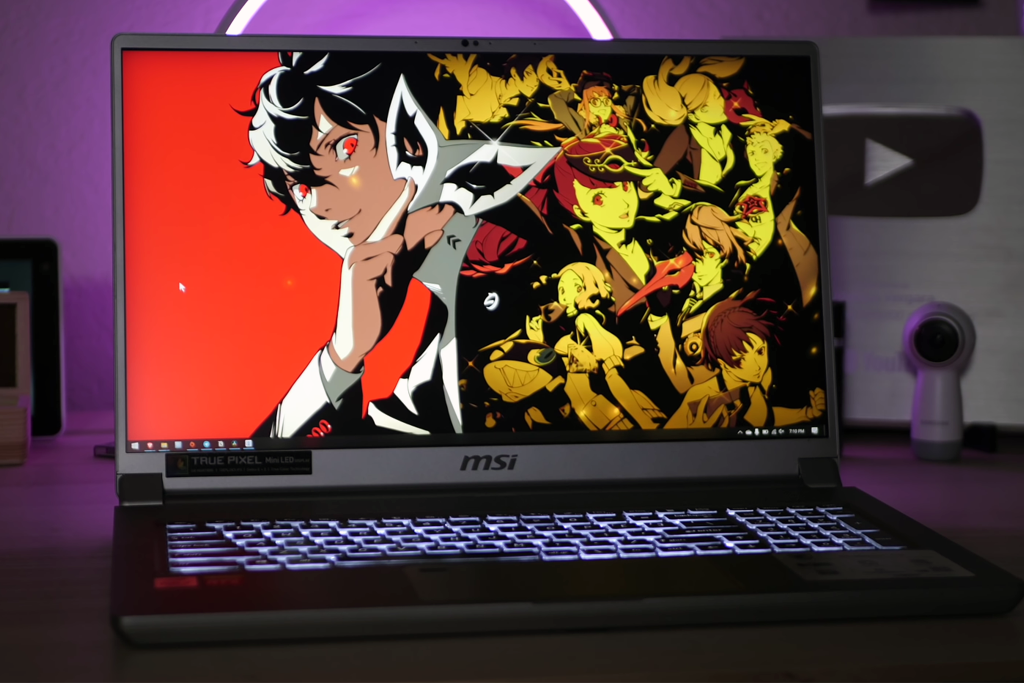
Adobe RGB: 100% | CPU: Intel Core i7-11800H (8-core, 2.4–4.6 GHz) | GPU: NVIDIA GeForce RTX 3060 (6 GB) | RAM: 16 GB DDR4 | Screen: 17.3", 3840 x 2160, IPS, 120 Hz | Storage: 512 GB PCIe SSD
I decided to test the MSI Creator 17 first, as I often saw it at the top of Amazon’s laptop for Photoshop lists, and wanted to check whether it had 100% Adobe RGB. I used it to edit high-resolution stacked jewelry photos in RAW and 4K video clips captured during our studio sessions.
The mini LED 4K screen supports brightness of around 1000+ nits. It makes the tiniest gemstone sparkle brighter and more noticeable. With the help of a colorimeter, I measured 100% Adobe RGB, 99% sRGB, and 96% DCI-P3, making it an excellent option to consider.
This is the best laptop display with Adobe RGB, as it helped me work on my photo projects on a professional level. I was able to edit multi-layer PSD files and batch export pictures in Lightroom. This laptop for video editing delivers a seamless performance, as it has the RTX 3080 GPU.
However, it’s quite heavy for a regular laptop, making it difficult to use on the go. Battery life is also rather non-impressive, as the laptop lasts only 4–5 hours when I work on light tasks. This is why I used it mostly on my desk.
Amazon: 100+ bought in the past month
Best Buy: 900+ sold in the past year
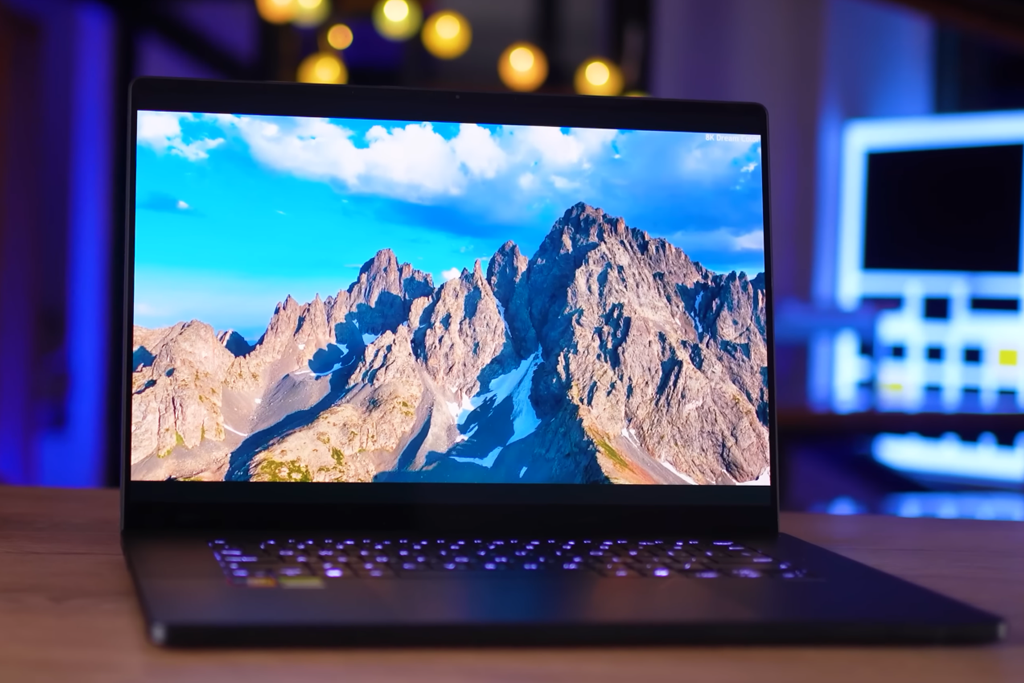
Adobe RGB: 100% | CPU: AMD Ryzen AI 9 HX 370 | GPU: NVIDIA GeForce RTX (8 GB GDDR6) | RAM: Up to 64 GB | Screen: 16" OLED, 3840 x 2400, 16:10, 60 Hz | Storage: Up to 2 TB SSD
A colleague of mine highly recommended the ASUS ProArt P16, so I decided to test it when editing jewelry photos for a FixThePhoto project. It meets the needs of creative professionals perfectly. The 4K OLED display has rich and true colors. I measured 100% Adobe RGB, 99.5% sRGB, and 99% DCI-P3, which is more than sufficient for most tasks.
I was pleased with the built-in ASUS Dial. I customized it to adjust brush size and use zoom, which saved me a lot of time in PS. This laptop for graphic design also delivers impressive performance. I used it to work on large TIFFs and batch-resize without lag. The AI noise reduction via NVIDIA Studio drivers is perfect for enhancing the skin texture and cleanup when editing close-ups.
While I like that this model is portable, it’s prone to overheating and should be used on a surface with sufficient airflow. The battery lasts up to 6 hours on medium-level tasks, which is enough for a workstation laptop sold in this price bracket.
Amazon: 150+ bought in the past month
B&H: 1.6K+ sold in the past year
Best Buy: 1.2K+ sold in the past year
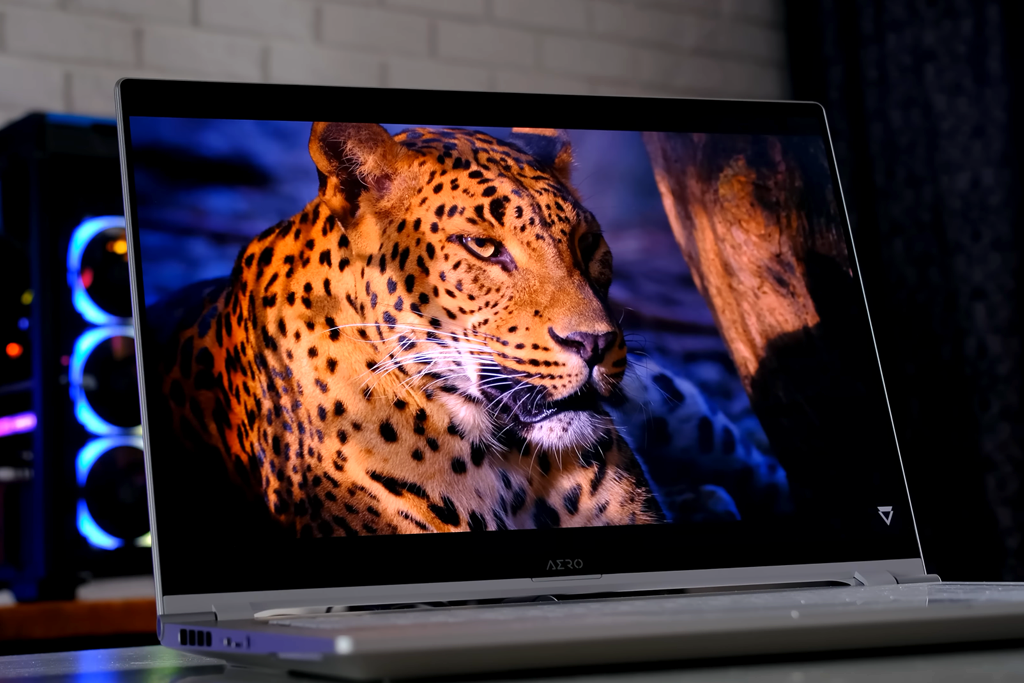
Adobe RGB: 100% | CPU: Intel Core i7/i9 | GPU: NVIDIA GeForce RTX 40 | RAM: Up to 32 GB | Screen: 16", 3840 x 2400, OLED | Storage: Up to 2 TB SSD
Reddit users raved about the Gigabyte Aero 16 in their reviews, and now I understand the reason behind their enthusiasm. I tested it when working on an e-commerce photoshoot that involved focus stacking and retouching, and a motion graphics ad for a company selling gemstones. This laptop for Adobe Creative Suite coped with every task perfectly.
The OLED 4K screen is Pantone validated, which was confirmed when I measured it using calibration tools. It has 100% Adobe RGB, 100% sRGB, and 99% DCI-P3, making it an excellent laptop with the best Adobe RGB coverage in this price segment. Blacks were rich, highlights looked beautiful, making it easier to work on photos of metallic surfaces and gemstones.
Besides, it can be used as a laptop for animation. In After Effects, I created animated promo loops. The RTX 4070 helped me achieve crisp playback even when I used effects layers. The only noticeable shortcoming is that the fans can be noisy under pressure. Besides, the battery lasts only 5–6 hours when I work on simple tasks.
Amazon: 500+ bought in the past month
B&H: 6K+ sold in the past year
Adorama: 5K+ sold in the past year
Best Buy: 4.5K+ sold in the past year
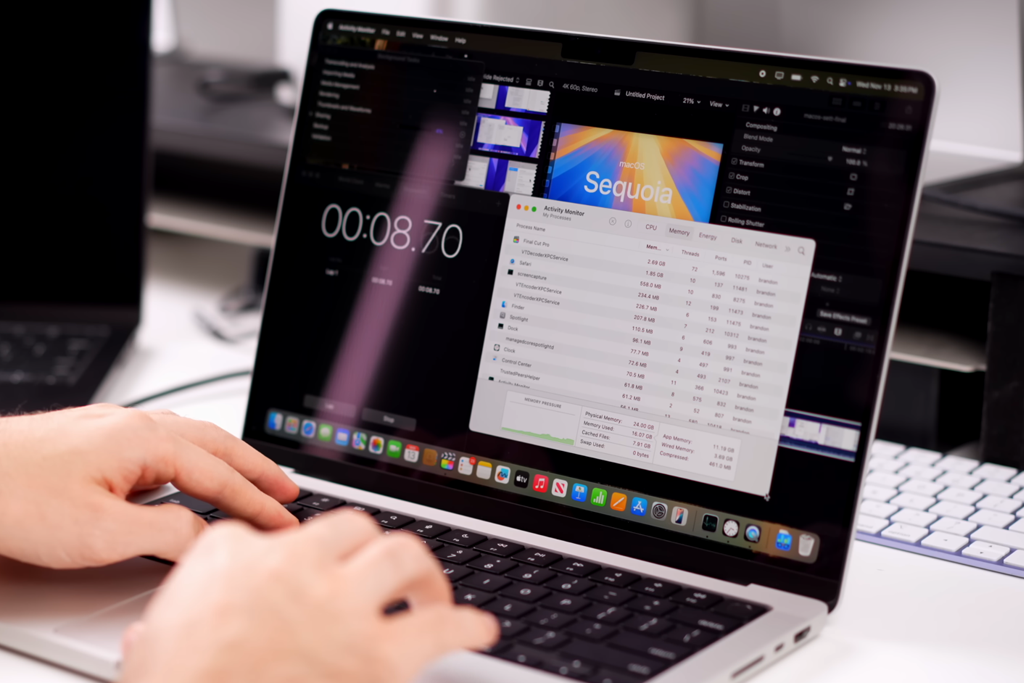
Adobe RGB: 91% | CPU: Apple M4 Pro/Max | GPU: Integrated (Apple GPU) | RAM: Up to 128 GB | Screen: 16", 3456 x 2234, Mini-LED, 120 Hz | Storage: Up to 8 TB SSD
I decided to test this MacBook after my colleague told me that she often used it as her main laptop for Adobe Illustrator. I used it to see whether it was suitable for my retouching tasks. This is why I started editing PSD with multiple layers, performing RAW edits, and editing high-bitrate 4K ProRes footage.
The Liquid Retina XDR display looked great and had stunning color accuracy. I measured 100% sRGB, 100% DCI-P3, and about 91% Adobe RGB. The latter was lower than I predicted, but the DCI-P3 color space had such a wide gamut that I did not notice any substantial issues when working.
It was easy to work with photos. There were no lags even when I exported batches of files. When using Final Cut and DaVinci Resolve to process videos, M4 Pro helped me perform color grading faster than other laptops.
Besides, most of the time, I did not hear any fan noise. The battery lasted over 12 hours. What makes it the best Apple laptop in its class is its portability and build quality. However, if you are looking for laptops with the best Adobe RGB for under 1500 USD, you will have to find a cheaper model.
Amazon: 400+ bought in the past month
B&H: 5K+ sold in the past year
Adorama: 4K+ sold in the past year
Best Buy: 3.5K+ sold in the past year
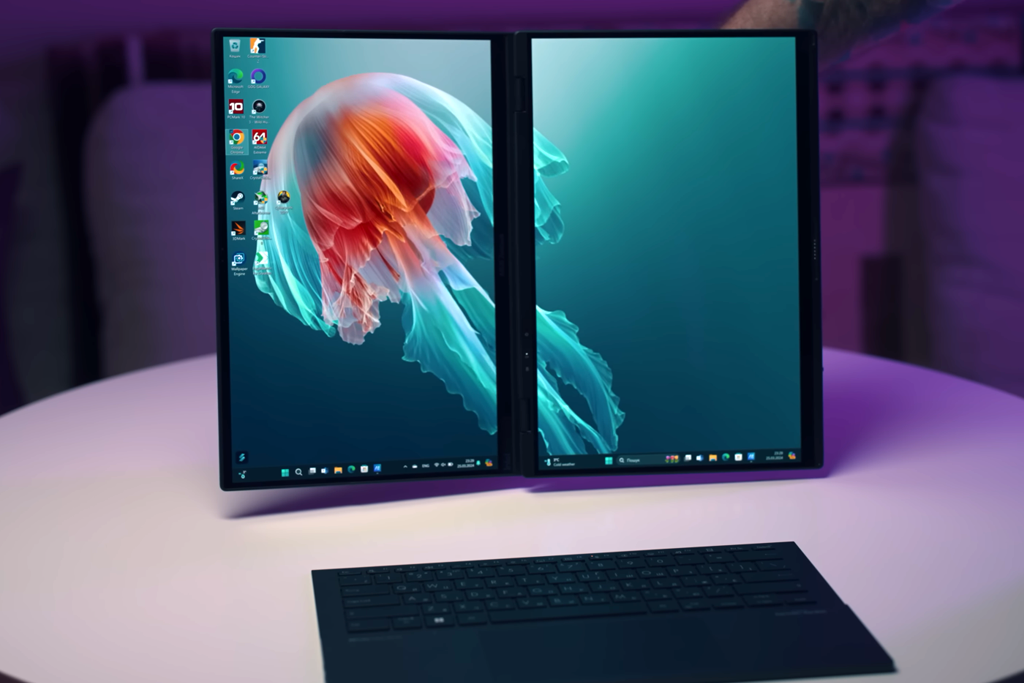
Adobe RGB: 95% | CPU: Intel Core Ultra | GPU: Intel Arc or NVIDIA RTX | RAM: Up to 32 GB | Screen: Dual 14"/15.6" 4K OLED/IPS, 100% DCI-P3 | Storage: Up to 1 TB SSD
I decided to test the ASUS Zenbook Duo after one of my clients recommended me to use this laptop for drawing. I was impressed with its performance, as this Adobe RGB laptop screen looked as if it were designed specifically for creatives.
I used it to work with storyboards in Illustrator, create animation keyframes in After Effects, and perform beauty retouching in Photoshop. The dual OLED 3K screens gave me plenty of space to work with layers, timelines, and brush settings. There was no need to use any additional monitor.
In terms of color, both screens support 100% sRGB, 100% DCI-P3, and 95% Adobe RGB, as I discovered during SpyderX tests. I was impressed with the color consistency across the top and bottom panels. This laptop for artists delivers excellent performance. The combination of an i9 chip and RTX allows me to work on 4K videos. The stylus makes it easier to work on details in Fresco.
The laptop seems a bit heavy; besides, the battery lasts only around 5 hours when you use both screens.
Amazon: 100+ bought in the past month
B&H: 1,5K+ sold in the past year
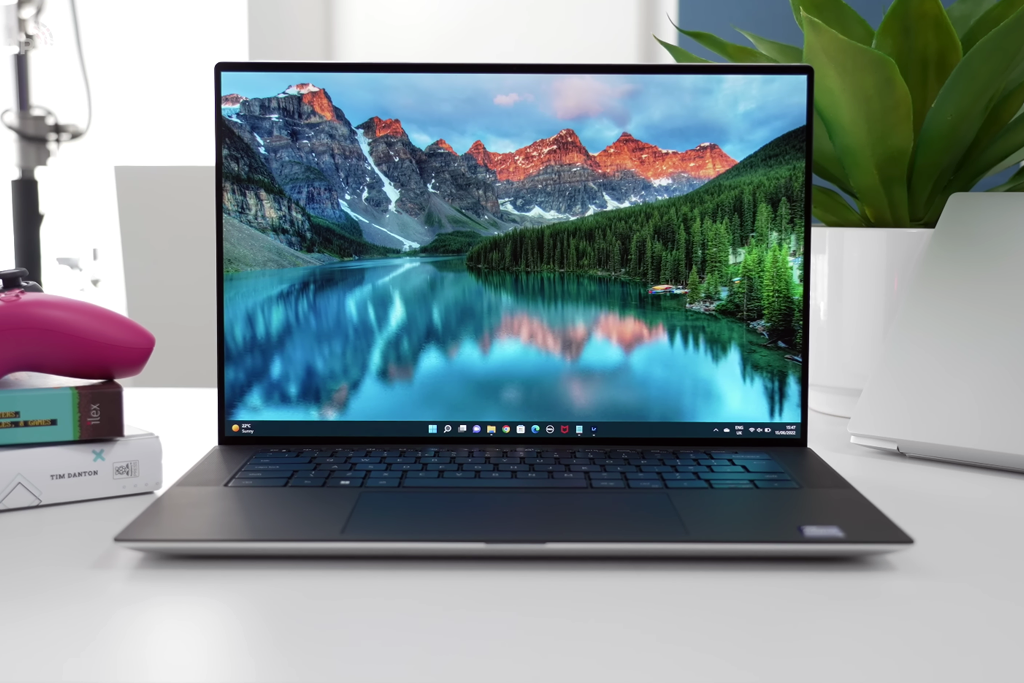
Adobe RGB: 93% | CPU: Intel Core i7/i9 | GPU: NVIDIA RTX 4050/4060 | RAM: Up to 64 GB | Screen: 15.6", 3840 x 2400 OLED or 3.5K IPS | Storage: Up to 2 TB SSD
I was excited to test the Dell XPS 15 after reading positive Reddit reviews written by professional photo editors and web designers who considered it a great Hackintosh laptop. With it, I designed a layout in Figma, built UI mockups in Photoshop, and also exported wedding photo galleries in Lightroom Classic.
The OLED 3.5K display stands out for contrast and impressive color accuracy. The results of my testing showed 100% sRGB, 99.5% DCI-P3, and about 93% Adobe RGB, which was enough for the tasks I worked on.
Using this Adobe RGB laptop, I was able to edit photos and videos. I noticed some signs of thermal throttling when I was rendering 4K videos. The keyboard and trackpad delivered excellent performance, like in other MacBooks. The slim chassis enhances the portability of this laptop. I understand why people believe that it is the best Windows-based laptop for web design.
The laptop lasted 7+ hours when I was working on photo tasks. The battery gets drained more quickly when I work on video. I liked the full SD card slot and Thunderbolt 4 support.
Amazon: 100+ bought in the past month
B&H: 1.5K+ sold in the past year
Adorama: 1.3K+ sold in the past year
Best Buy: 1K+ sold in the past year
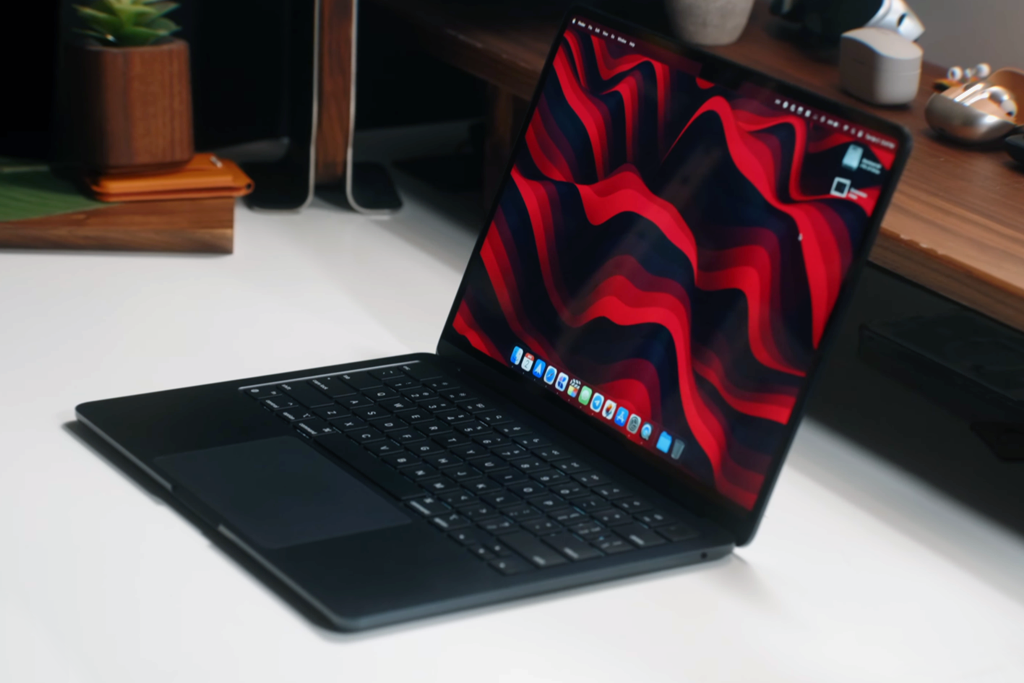
Adobe RGB: 88% | CPU: Apple M3 | GPU: Integrated (Apple GPU) | RAM: Up to 24 GB | Screen: 13.6", 2560 x 1664, IPS, 500 nits | Storage: Up to 2 TB SSD
A colleague of mine told me that this fanless laptop was her favorite model for daily tasks, so I decided to check whether it would be suitable for my photo and video editing needs. I used it when working in Lightroom and Photoshop. I edited 42MP RAWs from the Sony A7R III and exported a short 4K clip in Final Cut Pro.
Despite its slim profile, this Adobe RGB laptop delivers a powerful performance. The 13.6" Liquid Retina screen has impressive color accuracy. I measured 100% sRGB, 99% DCI-P3, and 88% Adobe RGB. It’s sufficient for most color-related tasks, except fine print proofing. Even though you might notice some dimness outdoors, it remains bright when you work indoors.
It does not weigh much, making it perfect for avid travelers. I was pleased with its battery, as it lasts up to 13 hours when I work on editing tasks and use the browser. Even though I won’t use it as my main laptop when editing, it’s an excellent laptop for college students who are making their first steps in digital art and design. It would be great if Apple added a version with a matte screen.
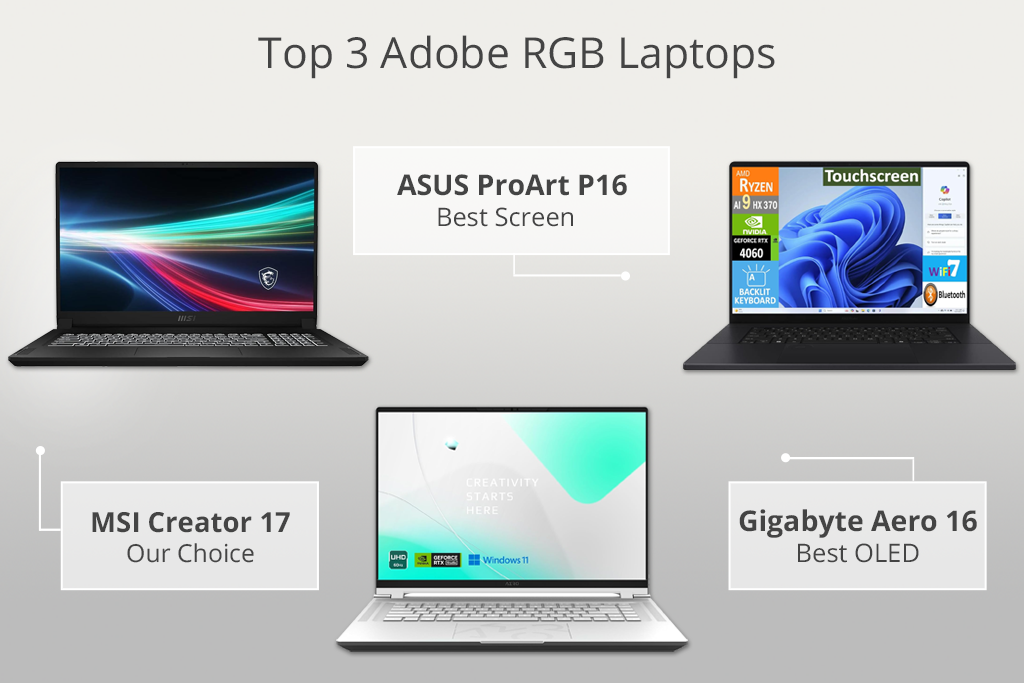
When looking for the best Adobe RGB laptop for creative professionals, I thoroughly tested over 20 models to see whether they could be used for the tasks I worked on daily and for FixThePhoto team’s projects.
I had been testing these laptops for three months, trying to find the best option using feedback from my colleagues, Reddit reviews posted in r/editors and r/photography threads, and Amazon reviews. We rented most of the models we tested from B&H and other widely used US rental services. In addition, I borrowed some laptops from my colleagues.
This thorough testing process helped me discover Adobe RGB laptops that delivered consistent performance under a heavy workload.